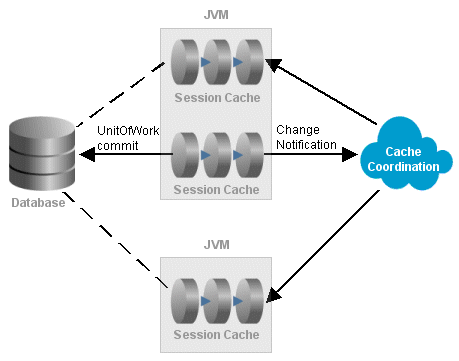Understanding EclipseLink,
2.7 |
|
The need to maintain up-to-date data for all applications is a key design challenge for building a distributed application. The difficulty of this increases as the number of servers within an environment increases. EclipseLink provides a distributed cache coordination feature that ensures data in distributed applications remains current.
Cache coordination reduces the number of optimistic lock exceptions encountered in a distributed architecture, and decreases the number of failed or repeated transactions in an application. However, cache coordination in no way eliminates the need for an effective locking policy. To effectively ensure working with up-to-date data, cache coordination must be used with optimistic or pessimistic locking. Oracle recommends that you use cache coordination with an optimistic locking policy.
Tune the EclipseLink cache for each class to help eliminate the need for distributed cache coordination. Always tune these settings before implementing cache coordination. For more information, see "Monitoring and Optimizing EclipseLink-Enabled Applications" in Solutions Guide for EclipseLink.
You can use cache invalidation to improve cache coordination efficiency. For more information, see "Setting Entity Caching Expiration" in Solutions Guide for EclipseLink.
As Figure 8-2 shows, cache coordination is a session feature that allows multiple, possibly distributed, instances of a session to broadcast object changes among each other so that each session's cache is either kept up-to-date or notified that the cache must update an object from the data source the next time it is read.
|
You cannot use isolated client sessions with cache coordination. For more information, see Shared, Isolated, Protected, Weak, and Read-only Caches. |
Figure 8-2 Coordinated Persistence Unit (Session) Caches

When sessions are distributed, that is, when an application contains multiple sessions (in the same JVM, in multiple JVMs, possibly on different servers), as long as the servers hosting the sessions are interconnected on the network, sessions can participate in cache coordination. Coordinated cache types that require discovery services also require the servers to support User Datagram Protocol (UDP) communication and multicast configuration. For more information, see Coordinating JMS and RMI Caches.
Cache coordination can enhance performance and reduce the likelihood of stale data for applications that have the following characteristics:
Changes are all being performed by the same Java application operating with multiple, distributed sessions
Primarily read-based
Regularly requests and updates the same objects
To maximize performance, avoid cache coordination for applications that do not have these characteristics.
For other options to reduce the likelihood of stale data, see About Handling Stale Data.